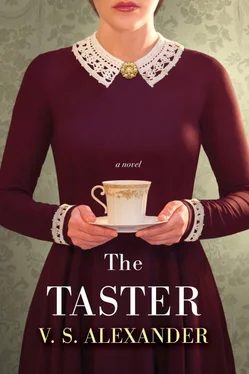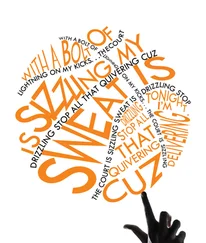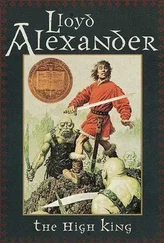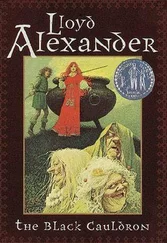I didn’t want to hear his words—not because of Germany, but because I was selfish. Karl’s life was in danger. Anyone who defied Hitler was doomed. “Only a few men know about this? You’re taking a huge risk.”
Karl nodded. “A risk worth dying for.”
I trembled as if an icy wind had raced over me, my body full of conflicting emotions. On the one hand, I recognized my growing attraction for Karl and I admired his strength, courage and conviction. Not every man would place his life in a woman’s hands, or ask that she join him in keeping such a powerful and dangerous secret. The pictures he had shown me were already seared into my memory. What kind of tyrant could order these kinds of deaths? Shouldn’t all of Germany rise up to stop such atrocities? But so few people knew and what use would it be to start a revolution? The Reich, and its powerful officers, would crush anything in its way. Then I pictured Ursula dead upon the ground. She had sacrificed herself for her brothers. How could I dishonor her and Karl by ignoring the photographs? Karl studied me, awaiting my response. Finally, I asked, “What do you want me to do?”
“Offer your strength,” he said, grasping my hands. “Don’t betray me. I’m not alone, but few can be trusted.” His breath caught and he stroked my hair. “It’s too much to ask, but perhaps one day you’ll return the love I feel.”
I wanted to draw away because his words overwhelmed me. The only man who had ever professed love for me was my father. “Why should I love you when you may die? There’s no future in death.”
“If Hitler continues to lead there will be no future for anyone.” He rose from my bed and looked down upon me. “I must get back. Think about what I’ve said.”
He started to leave, but I gripped his arm. “Did you know Ursula was planning to poison the Führer?”
“Only through her hints, but she talked about it as if it were a joke. That’s what we were whispering about at the Teahouse the day we went. I cautioned her not to be so brazen, but I had no idea she had taken it upon herself to poison him without anyone’s help. She was so bitter about her brothers’ deaths. I was trying to comfort her—in fact, squelch such talk about Hitler.
“Poisoning the tea was a foolish thing to do. She would have killed everyone who drank at his table. It was a suicide mission. If she hadn’t been identified as the perpetrator, all of us might have been executed.”
I hesitated, but then admitted, “I saw the poison on her apron. I didn’t know what it was.” Pangs of sorrow stabbed at me. “Maybe I could have stopped her if I had known, but would I want that knowledge? What would become of my parents if the SS thought I was involved? I don’t want them to die. They’re all I have in the world.”
“Ursula loved her brothers more than her own life. She died for them. The madness gripping us demands stern sacrifices. That’s the truth. If you decide to join me, either of us might be killed. Your parents might be in danger as well. The Gestapo and the SS have ways of making death quite unpleasant. No one wants to be a hero, but consider what we’ve talked about.”
He bent down, kissed me on the cheek and then quietly walked out. My head swam with emotion as I crawled into bed. Was I willing to risk my life, and perhaps my parents’ lives, for Karl? The pictures he had shown me ran through my head as the hours dragged by. Could the world be saved from such horrors? I tossed and turned.
After a few hours of fitful sleep, I awoke. My view had shifted. Calm descended upon me. Ursula had sacrificed herself for the love of her brothers. Could I sacrifice myself in order to shorten the war? My heart told me that Karl and his love for me were true. I tried to ignore the feelings building inside me, but something greater than myself was urging me on. I had to trust my intuition.
I was no longer the sensible Magda who had entered the civilian service only for a job. Now I was Magda Ritter, a woman who could be a traitor, a co-conspirator in the Führer’s death and—if I followed my heart—a lover of Captain Karl Weber.
THE WOLF’S LAIR
RASTENBURG
Hitler disappeared in early July 1943. Preparations started in late June, and he vanished within three days as did nearly everything connected with him. The Berghof housekeeper and her husband remained, as did those charged with keeping the residence in readiness should Hitler return. Martin Bormann stayed for a few days, but his brother Albert was gone, presumably with the Führer. Speer sped off to Berlin and we were told that Göring had vacated his home, which was located on a rise above the Berghof.
Karl slipped an envelope under my door in the middle of the night, addressed to me, to say he had been called by the Führer to Rastenburg and the Wolf’s Lair. He did not want to wake me. I was dismayed he had taken the risk because there would have been trouble had someone else gotten hold of the note. No one was supposed to know where Hitler was headed. After I read it, I burned it in Ursula’s ashtray and ground the ashes into the earth on a walk to the greenhouse. I was sad Karl had to leave, but I understood the nature of his job.
Cook had said little about Ursula’s poisoning, but I could tell she was upset. Her normally mild and cheerful demeanor turned cold and pallid in comparison to earlier days. The attempted poisoning had sent shock waves through the Berghof. Cook watched everyone with an eagle eye and supervised all the food preparation even though Hitler was no longer there. She wanted no mistakes, and, by implication, suspicion to fall upon her.
She lectured me one day about what a great loss it would be if the Führer were assassinated. “There would be no Germany,” she said. “We must stand by him to the end. Every sacrifice must be made.”
I only nodded and thought of the terrible pictures Karl had shown me—proof no one could deny. Yet, according to Karl, only a few officers knew about them. To distribute them to the German people would be folly. I wondered if the populace would even believe they were real. Most, under the Reich’s constant propaganda barrage, would think they were manufactured by Jews or Bolshevists. Goebbels would use such a tactic to his advantage to stir up the people. Dirty Jews or communist swine had produced these photos to ferment dissension, he would preach from his political pulpit. He was a master at his art.
In my first few days without Karl, my thoughts were filled with misgivings and apprehension about any attack on Hitler. To follow Karl might mean my death and, most likely, a similar fate for my parents. My heart longed for his love, but a careful, rational look at our situation brought fear and doubt. I could not abandon my parents to the Gestapo and their tactics; even Uncle Willy and Aunt Reina might be persecuted. What if my love affair with Karl blossomed into a full-fledged relationship? Any misstep, any informant, any error in judgment could cost him his life. What if we were married and I became pregnant? Could I carry a child through the horrors of war, bear it and bring it into a world of despotic criminals? These conflicts tore at my mind until I was exhausted from thinking.
One evening in early July, after a halfhearted tasting and meal, I walked to the terrace to enjoy the air. An SS officer stood on the far side taking in the view. We were alone and I was happy because I didn’t want company. The chairs and sun umbrellas were piled in a corner—most of the furniture had been shoved aside because Hitler was no longer there. I sat on the stone railing and looked out over the valley. The long shadows of the setting sun cut purple swaths across the mountains. The green forests were turning gray in the fading light. The air was pleasant and carried a summer scent of grass and meadow flowers. I was absorbed in the beauty in front of my eyes when someone tapped my shoulder. The touch startled me and I turned to see Eva Braun.
Читать дальше












